During the fitness period, the diet should balance nutrition and calorie control, with a focus on supplementing high-quality protein and complex carbohydrates, and avoiding high sugar and high-fat foods.

1. Protein intake
Muscle building individuals should consume about 1.5 grams of protein per kilogram of body weight per day, with priority given to chicken breast, egg white, low-fat dairy products, etc. Protein can help repair muscle fibers damaged during exercise, and supplementing whey protein within 30 minutes after exercise is more effective. Vegetarians can choose plant-based proteins such as tofu and quinoa, but they need to pay attention to the amino acid ratio.
2. Carbon Water Selection
Low glycemic index carbohydrates such as oats and whole wheat bread should be consumed 1-2 hours before training to provide sustained energy. After high-intensity training, it is necessary to supplement fast absorbing carbohydrates such as bananas and white bread with protein to promote glycogen recovery. It is recommended that coarse grains such as brown rice and sweet potatoes account for more than half of the total daily staple food.
3. Fat control
Daily fat intake should not exceed 30% of total calories, mainly unsaturated fatty acids. Nuts, deep-sea fish, and avocados contain healthy fatty acids, but daily nut intake should be controlled within 20 grams. Avoid trans fats and fried foods, and use olive oil for low-temperature stir frying when cooking.

4. Water supplementation
Drink 500 milliliters of water in portions 2 hours before exercise, and replenish 150 milliliters every 15 minutes during exercise. High intensity training can use sports drinks containing sodium and potassium, but electrolytes need to be replenished after a single training session lasting more than 90 minutes. Avoid drinking large amounts of water at once to increase the burden on the heart.
5. Trace Nutrients
Dark vegetables should be consumed at least 300 grams per day to supplement with vitamin B and antioxidant substances. Iron deficiency can affect oxygen carrying capacity, and animal liver and blood products can be consumed in moderation. Calcium can be supplemented with low-fat milk and sesame paste, and vitamin D is recommended to be exposed to sunlight or supplemented.

Fitness diet needs to be dynamically adjusted according to training goals. During the weight loss period, a moderate calorie deficit should be maintained but not lower than basal metabolism. During the muscle gain period, a calorie surplus should be ensured. One deceptive meal can be scheduled per week to regulate metabolism and avoid overeating tendencies caused by long-term strict eating habits. Keeping a diet log can help analyze nutritional deficiencies, and it is recommended to consult a nutritionist to develop personalized plans for individuals with special physical conditions. At the same time, maintain a regular schedule and sufficient sleep to maximize the effects of diet and exercise.







Comments (0)
Leave a Comment
No comments yet
Be the first to share your thoughts!